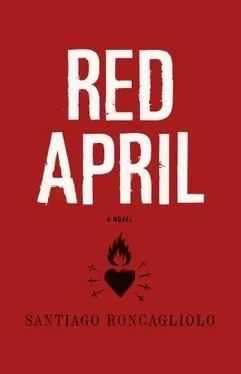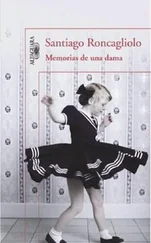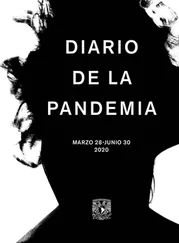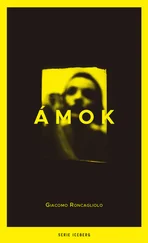“Why did he do that?” the prosecutor asked on that occasion. “Why did he let himself be killed that way?”
“To show that he doesn't care about dying,” the pilot replied.
Then the helicopter turned back toward the place where the flag had appeared, and riddled the underbrush, the trees, the bends in the river, the plants with bullets. The prosecutor asked again:
“And why are you shooting now at nothing?”
“To see if we hit any of the kids who saw him. That's part of their training. Sendero is full of thirteen-year-old children who get excited when they see these things. Each dead man with a flag like the one we've seen produces ten to twelve assassins ready to do the same thing.”
He remembered that episode for a moment before he collected his thoughts and answered Hernán Durango González:
“I will not permit you to compare the troops of the armed forces to …”
“There is no comparison. They're the watchdogs for their masters.”
“You people are defeated. You no longer exist.”
“Are you in the habit of talking to people who don't exist?”
The prosecutor thought about his mother. He hesitated.
“You … You are defeated. And let me remind you that you are a prisoner.”
“We're there, Señor Prosecutor. We're hunkered down. This prairie will catch fire, as it has for centuries, when a spark ignites it.”
It will catch fire. The phrase made Prosecutor Chacaltana nervous. He repeated to himself that he should not engage in discussions or justify himself. He replied:
“I have come simply to ask you about Edwin Mayta Carazo. Not to listen to your speeches.”
The terrorist seemed to relax his gaze for a moment. He looked out the window. The windows in the offices had fewer bars than the ones in the cells. He spoke:
“You ought to visit maximum security prisons once in a while, Señor Prosecutor. Is this the first time you've come to one?”
“Well … yes. I previously did not have cases of this …”
“You ought to visit the cells. You'd see interesting things. Maybe it would rid you of that mania for distinguishing between terrorists and innocents, as if this were heads or tails.”
The prosecutor did not want to say what he said. But he could not avoid it.
“I am afraid I do not understand.”
“There's a man in prison for distributing Senderista propaganda, but he's illiterate. Innocent or guilty?”
The prosecutor mentally shuffled through the legal code searching for an answer as he stammered:
“Well, in a technical sense, perhaps …”
“Another's in prison for throwing a bomb at a school. But he's retarded. Innocent or guilty? And those who killed under threat of death? According to the law they are innocent. But then, Señor Prosecutor, we all are. Here we all kill under threat of death. That's what the people's war is about.”
There were too many questions together. The prosecutor's capacity for looking into regulations collapsed.
“I have limited myself to asking what you know about a suspect.”
“And I've limited myself to telling you, Señor Prosecutor.”
A silence like a tombstone fell between them. The prosecutor could not think of anything else to ask. He was confused. Perhaps he should not have come to the prison. He was not obtaining any useful information. He had already been warned that to interrogate a Senderista you need cunning, balls, and a club. The prosecutor was very thirsty. When he was about to end the interview, the terrorist asked:
“Now you tell me. How is your mamacita?”
Félix Chacaltana felt each muscle in his body contracting in a heavy, gray nausea. Durango had expressionless eyes, the contemptuous eyes the prosecutor had seen in every dirty terrorist who had been arrested.
“What?”
“I know you keep her memory alive. She died, didn't she?” Durango continued.
“I …”
“You were very little, weren't you?”
“How do you know that?” the prosecutor asked, perhaps only to reverse the roles in their encounter. Suddenly, it had seemed that he was the one being interrogated.
“The party has a thousand eyes and a thousand ears,” said Durango, smiling with inexpressive eyes fixed on those of the prosecutor. “They're the eyes and ears of the people. It's impossible to lock up and kill all the people, somebody's always there. Like God. Remember that.”
Associate District Prosecutor Félix Chacaltana Saldívar felt faint when he left the office, and he had a lump in his throat. Suddenly he felt more than ever that the case of the dead man in Quinua had something to do with him more concretely than he had imagined. He went into a bathroom in the guard building and washed his face. Since there was no toilet paper, he dried himself with his handkerchief while he smoothed the rebellious hairs in his combed-straight-back hairdo. He took a breath. He tried to relax a little. He opened the door and came face-to-face with Colonel Olazábal. He was startled. Olazábal, however, seemed attentive.
“How did it go? Did you get the information you wanted?”
“Yes, more or less …”
“You can come back whenever you like.”
“No … I don't think that will be necessary.”
He hoped it would not be necessary.
“Can I offer you something to drink? Coffee? Mate?”
“No, thank you. I think I ought to be going now.”
“I hope you'll give my regards to Commander Carrión.”
“Yes, of course.”
The prosecutor began to walk down to the exit. The police colonel was close behind him.
“And communicate to him my desire to support all his initiatives.”
“I will do that, yes.”
“Señor Prosecutor …”
“Yes?”
Associate District Prosecutor Félix Chacaltana Saldívar felt he should stop and face him. It was very difficult for him to do so. He wanted to leave. He was a little sorry he had insisted on the investigation. There are things better left alone and forgotten. There are things that are conjured up when you mention them, words that should not be said. Or thought.
“Do you think … Señor Prosecutor … that you could speak to Commander Carrión about something?”
“Tell me what it is. I will let him know.”
“I've been in a maximum security prison for ten years now. Within the chain of command, I ought to have a better position in the police region. I'd like at least to change my fate. Could you have the commander approve my transfer?”
Now the prosecutor felt that the look on the colonel's face came from a place light years away from his problems. He promised to do what he could and left the building, walking as quickly as he could, almost running, although he maintained the dignity appropriate to an official of his rank. As he crossed the plain that separated the prison from the city, he felt he was being watched. He turned. There was nobody for three kilometers around.
When he returned to the Office of the Prosecutor, he wrote his report.
Now, as the sun was setting, he continued his meticulous revision of the document, asking himself if it was worth sounding the alarm or if there was no alarm to sound or if talking about it would cost him his rank and his job. He understood the reasoning of Lieutenant of the Army of Peru Alfredo Cáceres Salazar and his investigative methodology, but it was not clear to him that Edwin Mayta was a terrorist. Perhaps he was merely thinking too much about the entire case. Perhaps Justino had simply lost his mind after his brother's arrest and thought the prosecutor had something to do with it. In any case, the prosecutor recapitulated, the whole problem is limited to one corpse and has already been resolved, there are plenty of corpses in Ayacucho and it is better not to poke your finger into any in particular because pus is gushing out of all of them. There was no terrorist threat. Terrorism was finished. The rest was nonsense propounded by the terrorists themselves in order to confuse people. He put the report in a drawer, under the pencils and forms for requesting supplies. Then he looked at his watch. It was time to go. He gathered his things and left punctually. He felt strangely nervous. Out on the street the tourists arriving for Holy Week were beginning to give a livelier image to the city. Most came from Lima but there were even some gringos, Spaniards, perhaps a Frenchman or two, the kind who travel through the Andes with backpacks. Prosecutor Chacaltana decided to stop at the restaurant and see Edith and relax a little. Perhaps it was also time to apologize for his absence. He had begun in a very impetuous way with her and then had disappeared. That was not how gentlemen behaved.
Читать дальше












